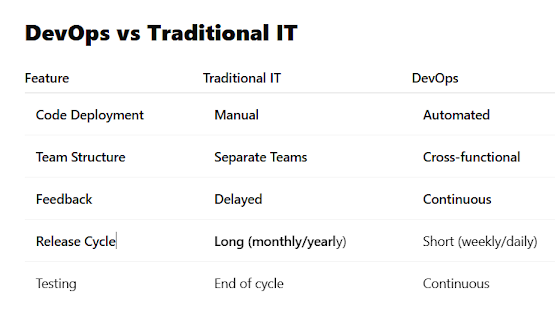Introduction to the DevOps Model
The DevOps model is a modern approach to software development that brings together two traditionally separate teams: development (Dev) and operations (Ops). The goal of DevOps is to shorten the software development lifecycle, improve collaboration, and continuously deliver high-quality software.
DevOps emphasizes automation, continuous feedback, and shared responsibility. It helps companies respond quickly to customer needs, fix bugs faster, and roll out new features efficiently. As businesses demand faster digital transformation, DevOps is becoming essential in modern IT environments.
What Is DevOps?
DevOps is not a tool or a product. It is a set of practices, cultural philosophies, and technologies that enable development and operations teams to work together more efficiently.
Key characteristics of DevOps include:
Continuous Integration (CI): Developers frequently merge code changes into a central repository.
Continuous Delivery (CD): Code changes are automatically tested and deployed.
Automation: Tasks like testing, building, and deploying are automated.
Collaboration: Development, operations, QA, and security work together.
Monitoring and Feedback: Systems are monitored constantly to ensure performance and reliability.
What Is DevOps Used For?
DevOps is used for:
Accelerating development cycles
Improving deployment frequency
Enhancing application quality and reliability
Reducing the time to fix issues
Improving collaboration between different IT roles
Whether you're building a mobile app, a web service, or an enterprise system, DevOps helps you deliver faster and better.
Who Can Use DevOps?
DevOps is suitable for:
Startups looking to move fast and iterate frequently
Enterprise companies wanting to modernize legacy systems
Agile development teams who release code frequently
Cloud-native companies adopting microservices and containers
IT teams managing large-scale infrastructure
DevOps is flexible. It can be used across different industries like finance, healthcare, retail, and media.
Advantages of DevOps
Here are the key benefits:
1. Faster Time to Market
Automation and streamlined processes lead to quicker releases.
2. Improved Collaboration
Teams work closely together, reducing silos.
3. Better Quality Software
CI/CD and automated testing reduce bugs and improve stability.
4. Continuous Improvement
Real-time monitoring helps in learning and improving future releases.
5. Reduced Downtime
Quick identification and resolution of issues keep services running.
6. Enhanced Security
DevSecOps integrates security checks early in the process.
Disadvantages of DevOps
No model is perfect. DevOps also has its challenges:
1. Cultural Shift Required
Teams need to change how they work and communicate.
2. Tool Complexity
Implementing and maintaining CI/CD pipelines, monitoring tools, and infrastructure-as-code solutions can be complex.
3. Initial Costs
Automation and tool setup may require investment in time and money.
4. Skill Requirements
Teams need knowledge in coding, automation, cloud platforms, and system administration.
5. Security Gaps (If Not Handled Well)
Speed can sometimes come at the cost of security if DevSecOps is not implemented properly.
DevOps Tools
A DevOps pipeline is supported by a wide array of tools:
CI/CD: Jenkins, GitHub Actions, GitLab CI, CircleCI
Version Control: Git, Bitbucket
Containerization: Docker, Podman
Orchestration: Kubernetes
Monitoring: Prometheus, Grafana, New Relic
Configuration Management: Ansible, Puppet, Chef
Infrastructure as Code: Terraform, Pulumi
Real-World Example
A large e-commerce company adopted DevOps to streamline deployment. Previously, it took them two weeks to release a new feature. After switching to DevOps:
Deployment time reduced to hours
Fewer bugs in production
Improved customer satisfaction
When Not to Use DevOps
DevOps may not be suitable if:
The team lacks the required skills
Project requirements are static and don't change often
There is no support from management
Regulatory compliance requires long testing cycles
References and Further Reading
DevOps is transforming how software is built and delivered. It requires commitment and skill but pays off with faster, more reliable, and more collaborative development cycles. For teams ready to adapt, DevOps offers a competitive edge in a fast-moving digital world.

No comments:
Post a Comment